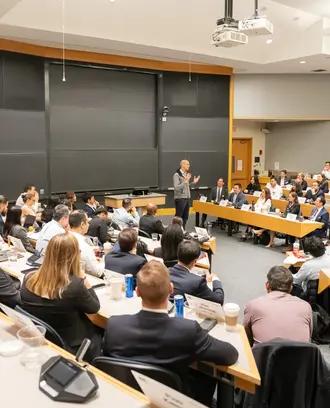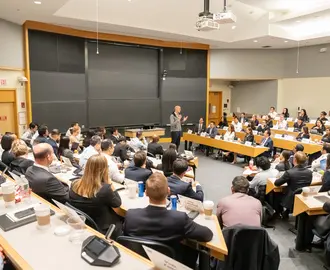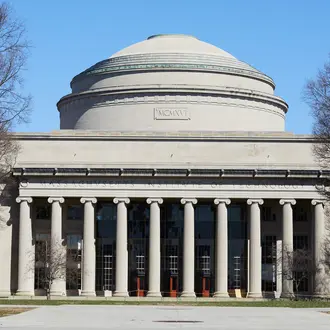When Stephen Barr, EMBA ’20, entered the MIT Executive MBA, he was already a seasoned executive in the media industry with more than 20 years of experience. Yet, as the magazine publishing industry faced seismic shifts, Barr saw an opportunity to recalibrate his skills and expand his perspective. The MIT EMBA’s focus on principled, innovative leadership and global impact became the perfect fit for this transformation.
Today, as Senior Vice President for Non-Traditional Revenue and Strategy at CBS Stations under Paramount Global, Barr credits the EMBA journey with equipping him to lead with empathy, drive innovation, and inspire his teams.
What motivated you to pursue an Executive MBA at MIT Sloan?
Stephen Barr, EMBA '20
When I decided to pursue the EMBA, I was at a critical point in my career. The magazine publishing industry, where I spent much of my career, had been undergoing a seismic shift, driven by technological disruptions and the aftermath of the 2008 financial crisis. It became clear that staying relevant required more than just tenure and experience; it required new ways of thinking. I wanted to expand my toolkit, so I sought out a program that could provide both the academic rigor and the practical insights needed to pivot within my industry. I knew I needed to upskill and broaden my knowledge base to remain relevant and adaptable.
I already had a master’s degree in Media Management focused on Digital Media & Publishing from New York University, but realized there were gaps in my foundational knowledge—particularly in areas like design thinking, organizational processes, and financial management. I wanted to understand the emerging trends reshaping industries and learn how to lead effectively in this new environment.
MIT stood out for its emphasis on innovation and systems thinking. I wanted to be part of a program that didn’t just teach business principles but focused on applying them to solve real-world challenges. The cohort was another major factor, as I wanted to learn from peers with diverse experiences and perspectives. The EMBA program offered exactly that.
What specific courses or professors had the most impact on your leadership style?
Each course at MIT Sloan brought something unique to my approach, but here are some that had both immediate relevance and lasting impact:
- System Dynamics with Nelson Repenning completely transformed how I think about organizational effectiveness. I learned to identify inefficiencies and implement feedback loops that improved productivity. For example, at CBS Stations, I conducted a listening tour with my team, asking them to list the top 20 things they loved and hated about their jobs. By synthesizing their feedback and identifying common pain points, we reallocated resources and introduced new accountability processes. This approach boosted productivity, morale, and ultimately revenue. By mid-year, we were tracking 15 percent ahead of goals, and by year-end, we had over-delivered by 40 percent.
- DMD (Data, Models and Decisions) with Georgia Perakis sharpened my ability to make data-driven decisions. One instance was at Univision, where I reimagined how we communicated the brand equity of Hispanic markets to advertisers by using predictive analytics, directly contributing to revenue growth. I became much more data-savvy, leveraging research metrics to craft compelling narratives that resonated with clients. This shift from gut instinct to data-driven decision-making was instrumental in securing major deals.
- Organizational Processes with Roberto Fernandez helped me navigate internal politics and foster collaboration. During a listening tour at CBS Stations, I incorporated the three-lens framework—strategic, cultural, and political—to address team concerns and implement changes that empowered my team to lead. I shifted from a directive leadership style to one that emphasizes collaboration and trust. By stepping back and allowing my team to take ownership, I’ve seen significant improvements in engagement and performance.
What role has the MIT network played in your career development?
The MIT network has been an invaluable resource throughout my career. My cohort was incredibly diverse, with leaders from industries like medicine, technology, and education. This diversity added depth to every interaction and discussion. I learned a great deal from classmates who were entrepreneurs and technologists, whose insights have influenced my own decision-making.
Even after graduation, the network has continued to play a critical role. I’ve consulted classmates for advice on strategic decisions and collaborated with them to refine ideas. During a restructuring at CBS Stations, I worked with a peer specializing in organizational design, whose input directly improved team alignment and performance.
The network’s value isn’t just in professional advice—it’s provided lifelong friendships and a shared sense of purpose. Whether navigating challenges or exploring new opportunities, I can rely on this community for support and inspiration.
How has your definition of leadership evolved since completing the program?
Before the EMBA program, I viewed leadership as being at the forefront, driving change. Now, I see it as a responsibility to empower others. Leadership doesn’t always mean being the loudest voice in the room; it’s about creating an environment where your team can thrive.
For me, success is now tied to the success of the people I manage. I want my team members to grow into leaders themselves, carrying forward the lessons we’ve learned together. This shift in perspective has made me a more empathetic and effective leader.
What advice would you give to prospective EMBA students?
Ask yourself what kind of leader you want to be and whether you’re ready to invest in your growth. The EMBA program is an incredible opportunity to level up your skills and broaden your perspective. It’s not just about career advancement; it’s about evolving as a person.
If you’re willing to put in the work, the dividends—both personal and professional—are immeasurable. For me, the program was an investment in myself, one that continues to pay off in ways I couldn’t have imagined.



